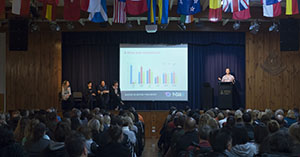Profile // Dr. Wayne Warburton
Dr. Wayne Warburton says statistics suggest that in most high school classrooms in Australia, one teenager would have a gambling problem.
‘‘Studies of Australian youth gambling show 3 to 4 per cent of teenagers have a problem – in adults it’s around 0.5 to 1 per cent of the population. Teenagers may be more susceptible to problem gambling because the adolescent brain is still ‘under construction’, but it’s not an obvious problem. Most parents wouldn’t know their teenager was having difficulties because teenagers tend to be very reluctant to admit to gambling – it’s illegal under the age of 18 and teenagers don’t want to get into trouble either for gambling or for the ways they may have obtained the money to gamble. They may also feel ashamed and not want their social network to know just how many people they have borrowed from.
“For many teenagers, a gambling problem begins online with an activity that isn’t strictly gambling but gets them in the mindset to gamble. Many video games have a gambling component, and other games that simulate gambling (such as online ‘slot machines’) are commonly advertised on many social media sites.
“Online gambling games are programmed to make you win – it’s almost impossible to lose. They groom you to believe you are going to win a lot of money gambling, that you are skilled at it, and such beliefs can promote gambling behaviour.
“Typically several of the top 10 iPhone gaming apps are casino-style games. You can spend as much as you want, but because they don’t involve winning money, they’re not ‘gambling’ so are unregulated. We know that kids access these sites and apps, and also play online video games that have a gambling component. Many games have gambling-like devices to progress, or skins that can be gambled online, or loot boxes that can be purchased. Interestingly, loot boxes were recently shown scientifically to have most of the same characteristics as gambling. Research also suggests that making in-app purchases for gambling-like activities is predictive of developing a gambling problem later.
“Parents need to know about gambling apps and simulated gambling and to realise that for some kids this will be a precursor to developing a gambling problem. And remember, kids can spend lots of money on these games before progressing to actual gambling. It’s big money and a big industry.
“For some teenagers, gambling becomes a bigger part of their life and school becomes less and less important. Gambling becomes more important than friendships and family, and teenagers often start to lie about money and what they are doing with their time. Teenagers usually don’t have access to large amounts of money so they may steal from parents, buy and sell things illegally, or use a stolen credit card.
“On a practical level, parents can keep internet-connected devices out of bedrooms and in public areas of their home. Use internet blocking devices that block pop-ups and invitations to gamble from coming up on screen. You can also use internet monitoring software, although your teenager won’t think that’s very cool!
“Because children/teenagers are reluctant to talk about gambling, even when they’re in financial difficulty and are scared that their gambling is out of control, parents need to know how to talk with a teenager about it.
“Keep the conversation open. Talk about the traps but don’t be judgmental. Explain that playing gambling-like games online and making in-app purchases increases the risk of developing a gambling problem. Educate them about the inflated win-rate of such games and the low chances of success in real gambling – the odds of winning a poker machine jackpot are 9.7 million to
one. They have a greater chance of being struck by lightning (‘just’ 1.6 million to one). Help kids understand that these online games and apps are designed to suck them in – and they do a
really good job.“
// REMOVE TEMPTATION
POPULAR INTERNET GAMBLING FILTERS
• GamBlock
• Betfilter
INTERNET MONITORING SOFTWARE
• Qustodio
• Norton Family
• Net Nanny
• Surfie (good for mobiles)
BETTING IN SPORT
Psychologist Jo Lamble shares some tips for starting a conversation:
• Make use of stories
• Learn how to listen so your children will talk
• Choose the right time
• Use some humor
• Tailor your message to their interests
• Leave them wanting more
OTHER HELPFUL RESOURCES
Australian Council on Children and the Media app reviews with clearly labeled gambling information // childrenandmedia.org.au/app-reviews/
KidBet // kidbet.com.au
Gambler’s Help Youthline (24/7) // 1800 262 376
Gambling Help Online // www.gamblinghelponline.org.au
Parent resources // www.responsiblegambling.vic.gov.au
// Dr. Wayne Warburton is an Associate Professor of Developmental Psychology at Macquarie University.




